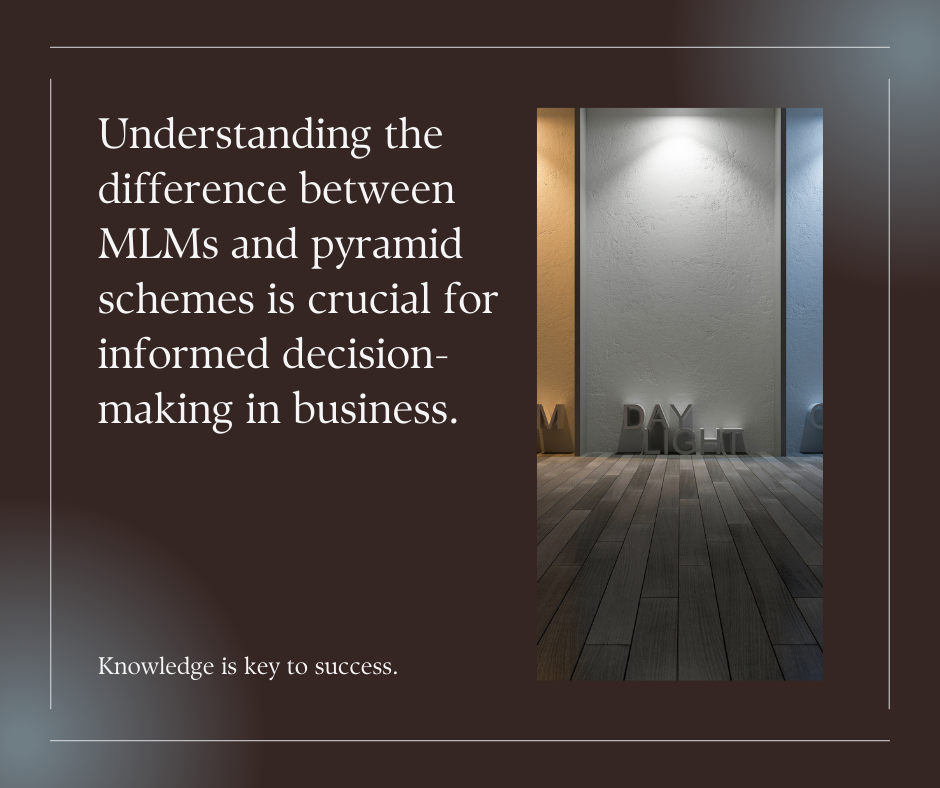Multi-Level Marketing (MLM) and pyramid schemes are often confused due to their similar structures, but they are fundamentally different in terms of legality, ethics, and operations. In this post, we'll break down the key differences between MLMs and pyramid schemes, helping you to distinguish between a legitimate business opportunity and a fraudulent one.
What is Multi-Level Marketing (MLM)?
Multi-Level Marketing (MLM) is a legitimate business model in which companies sell products or services through a network of distributors. These distributors earn commissions not only from their own sales but also from the sales made by the people they recruit into the business, known as their downline. The key aspects of MLM include:
Product Focus: MLM companies sell tangible products or services. The primary source of income for participants is through the sale of these products to consumers.
Earning Structure: Distributors earn commissions on their sales and can also earn bonuses based on the sales of their downline. However, the emphasis is on selling products, not just recruiting new members.
Legitimacy: MLMs operate legally and comply with regulations. Successful MLM companies are transparent about their compensation plans and product quality.
What is a Pyramid Scheme?
A pyramid scheme is an illegal and unethical business model that focuses primarily on recruiting new participants rather than selling a legitimate product or service. Pyramid schemes are unsustainable and often collapse, leading to significant financial losses for most participants. The key aspects of pyramid schemes include:
Recruitment Focus: In a pyramid scheme, participants earn money mainly by recruiting others into the scheme rather than selling a product. The scheme relies on continuous recruitment to generate income.
No Product or Overpriced Products: Pyramid schemes may either offer no actual product or sell products that are overpriced and have little or no market value. The product is often just a facade to disguise the scheme.
Unsustainability: Pyramid schemes are inherently unsustainable because they require an ever-increasing number of recruits to keep the scheme going. Eventually, the scheme collapses when recruitment slows, leaving most participants with losses.
Illegality: Pyramid schemes are illegal in many countries because they defraud participants. Authorities often shut them down, and participants can face legal consequences.
How to Identify a Pyramid Scheme
To avoid getting involved in a pyramid scheme, it's essential to recognize the red flags:
Emphasis on Recruitment: If a company places more importance on recruiting new members than on selling products, it could be a pyramid scheme.
High Upfront Costs: Be cautious if you're required to pay a significant upfront fee to join or purchase products, especially if there's little emphasis on selling those products to actual consumers.
Lack of a Real Product: If the product is of poor quality, overpriced, or non-existent, this is a major warning sign.
Promises of Easy Money: Pyramid schemes often lure participants with promises of quick and easy wealth, which is rarely achievable in legitimate businesses.
Why MLMs are Legal and Pyramid Schemes are Not
The legality of MLMs comes down to their focus on real products or services and their compliance with legal regulations. Here’s why MLMs are legal:
Product Sales: MLMs generate revenue through the sale of actual products to consumers, not just by recruiting new members.
Transparency: Legitimate MLMs provide clear, transparent information about their compensation plans, the value of their products, and the business opportunity.
Sustainability: MLMs are sustainable businesses because they don’t rely solely on recruitment; they thrive on product sales and customer satisfaction.
In contrast, pyramid schemes are illegal because they are based on deception and exploitation, with the primary goal being to recruit more participants rather than sell a valuable product.
Conclusion: Making an Informed Decision
When considering joining an MLM or any similar opportunity, it’s crucial to do thorough research. Ensure that the company:
Offers real, valuable products or services.
Emphasizes product sales over recruitment.
Has a transparent and fair compensation plan.
Complies with local laws and regulations.
By understanding the differences between MLMs and pyramid schemes, you can protect yourself from potential scams and make informed decisions about the opportunities you pursue.
